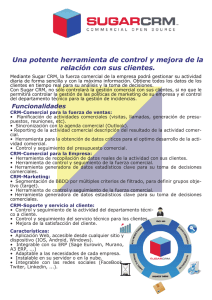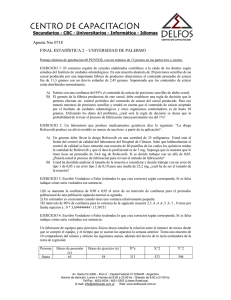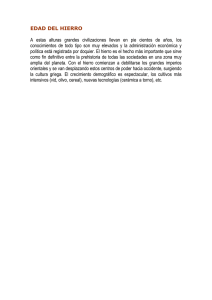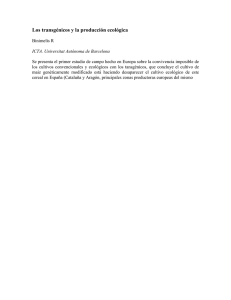PE2214S Sugar Content of Cereal - Spanish
Anuncio
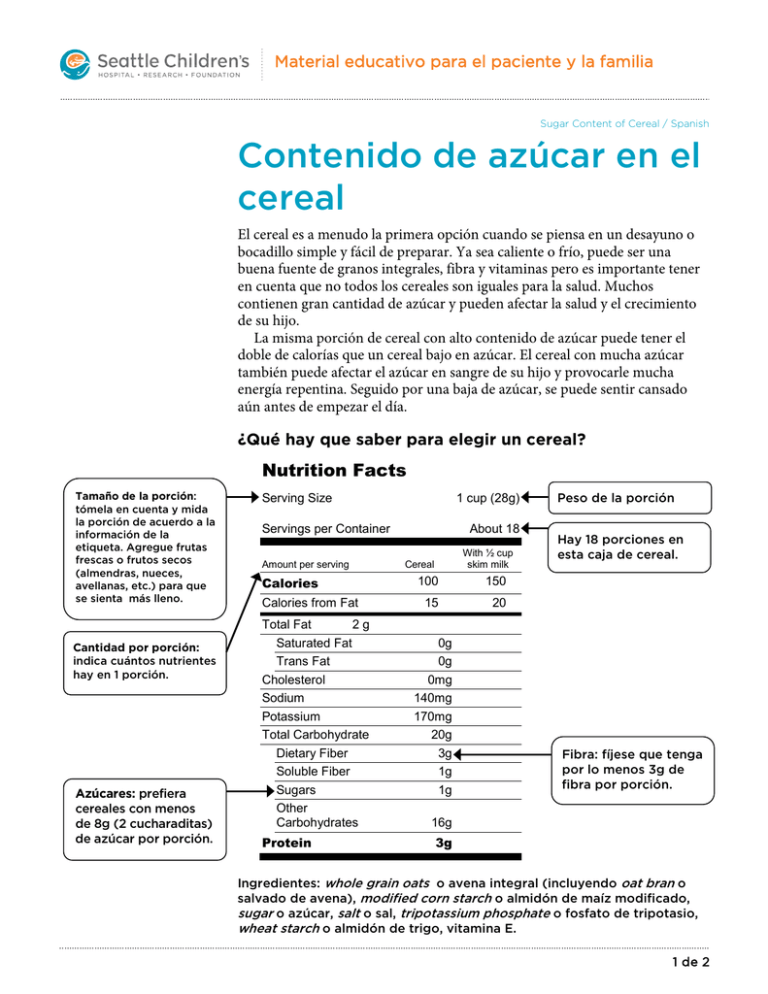
Material educativo para el paciente y la familia Sugar Content of Cereal / Spanish Contenido de azúcar en el cereal El cereal es a menudo la primera opción cuando se piensa en un desayuno o bocadillo simple y fácil de preparar. Ya sea caliente o frío, puede ser una buena fuente de granos integrales, fibra y vitaminas pero es importante tener en cuenta que no todos los cereales son iguales para la salud. Muchos contienen gran cantidad de azúcar y pueden afectar la salud y el crecimiento de su hijo. La misma porción de cereal con alto contenido de azúcar puede tener el doble de calorías que un cereal bajo en azúcar. El cereal con mucha azúcar también puede afectar el azúcar en sangre de su hijo y provocarle mucha energía repentina. Seguido por una baja de azúcar, se puede sentir cansado aún antes de empezar el día. ¿Qué hay que saber para elegir un cereal? Nutrition Facts Tamaño de la porción: tómela en cuenta y mida la porción de acuerdo a la información de la etiqueta. Agregue frutas frescas o frutos secos (almendras, nueces, avellanas, etc.) para que se sienta más lleno. Cantidad por porción: indica cuántos nutrientes hay en 1 porción. Azúcares: prefiera cereales con menos de 8g (2 cucharaditas) de azúcar por porción. Serving Size 1 cup (28g) Servings per Container Amount per serving Calories Calories from Fat Total Fat 2g Saturated Fat Trans Fat Cholesterol Sodium Potassium Total Carbohydrate Dietary Fiber Soluble Fiber Sugars Other Carbohydrates Protein About 18 With ½ cup skim milk Cereal 100 150 15 20 0g 0g 0mg 140mg 170mg 20g 3g 1g 1g Peso de la porción Hay 18 porciones en esta caja de cereal. Fibra: fíjese que tenga por lo menos 3g de fibra por porción. 16g 3g Ingredientes: whole grain oats o avena integral (incluyendo oat bran o salvado de avena), modified corn starch o almidón de maíz modificado, sugar o azúcar, salt o sal, tripotassium phosphate o fosfato de tripotasio, wheat starch o almidón de trigo, vitamina E. 1 de 2 Contenido de azúcar en el cereal Para más información • Servicio de Resistencia a la Insulina 206-987-4758 • Hable con el proveedor de atención médica de su hijo • www.seattlechildrens.org Servicio gratuito de interpretación • Dentro del hospital, solicítelo a la enfermera. • Fuera del hospital, llame a nuestra línea gratuita de interpretación: 1-866-583-1527. Menciónele al intérprete el nombre de la persona o extensión que necesita. Lea la lista de ingredientes Busque una corta lista y con ingredientes que reconozca y pueda pronunciar. Prefiera cereales sin o con poca azúcar. Fíjese que la lista tenga pocos o ninguno de estos ingredientes: • • • • • • • • Sugar (azúcar). Honey (miel). Molasses (melaza de caña de azúcar). Fruit juice concentrate (concentrado de jugo de frutas). Brown sugar (azúcar morena). High fructose corn syrup (Jarabe de maíz de alta fructosa). Brown rice syrup (jarabe de arroz integral). Maple syrup (jarabe de arce). Prefiera granos integrales. Busque ingredientes como “100% whole wheat (trigo integral)”, whole oats (avena integral), whole barley (centeno integral) u otros granos integrales. Compare cereales Menor contenido de azúcar (menos de 8g por porción): • General Mills Cheerios, original o multigrain. • General Mills Chex, de maíz (corn), arroz (rice) o trigo (wheat). • General Mills Kix, original. • Kellogg's Corn Flakes, original (corn flakes). • Kellogg’s Rice Krispies, original (de arroz). • Post Honey Bunches of Oats, honey roasted (avena tostada con miel) • Quaker Life Cereal, original. Más contenido de azúcar (más de 10g por porción): • General Mills Lucky Charms • Kellogg’s Cocoa Krispies • Kellogg’s Froot Loops. • Kellogg’s Frosted Flakes (azucarados). • Kellogg’s Honey Smacks. • Post Golden Crisp • Quaker Cap’n Crunch, original. Seattle Children’s ofrece servicio gratuito de interpretación para pacientes, familiares y representantes legales sordos, con problemas de audición o con inglés limitado. Seattle Children’s tendrá disponible esta información en formatos alternativos bajo solicitud. Llame el centro de Recursos Familiares al 206-987-2201. Este volante fue revisado por el personal clínico de Seattle Children's. Sin embargo, como las necesidades de su niño son únicas, antes de actuar o depender de esta información, por favor consulte con el proveedor de atención médica de su hijo. © 2015 Seattle Children’s, Seattle, Washington. Todos los derechos reservados. Nutrición 11/15 Tr (lv/jaw) PE2214S 2 of 2 Patient and Family Education Sugar Content of Cereal Cereal is often a top choice for a simple and easy to make breakfast or snack. Hot or cold cereal can be a great source of whole grains, fiber and vitamins. However, it is important to know that not all cereals are equal with regard to health. Many cereals are very high in sugar. Cereal that is high in sugar can impact your child’s health and growth. High sugar cereals can have nearly twice as many calories for the same serving size as a low sugar cereal. In addition, high sugar cereal can impact your child’s blood sugar. After eating a high sugar cereal, your child may have a boost in energy followed by a sugar let down. This can leave them feeling tired and worn out even before their day gets fully started. What should I look for when choosing cereal? Nutrition Facts Serving Size: keep portions in mind. Measure out serving size listed. Add fresh fruit or a spoonful of nuts to make cereal more filling. Serving Size Servings per Container Amount per serving Calories Calories from Fat Amount per serving: tells you how many nutrients are found in 1 serving. Sugars: choose cereals with no more than 8 g (2 teaspoons) of sugar per serving. 1 cup (28g) Total Fat 2g Saturated Fat Trans Fat Cholesterol Sodium Potassium Total Carbohydrate Dietary Fiber Soluble Fiber Sugars Other Carbohydrates Protein About 18 With ½ cup skim milk Cereal 100 150 15 20 0g 0g 0mg 140mg 170mg 20g 3g 1g 1g Weight of serving There are 18 servings in this box of cereal. Fiber: look for at least 3 g of fiber per serving. 16g 3g Ingredients: Whole grain oats (includes the oat bran), modified corn starch, sugar, salt, tripotassium phosphate, wheat starch, vitamin E. 1 of 2 Sugar Content of Cereal To Learn More • Insulin Resistance Clinic 206-987-4758 • Ask your child’s healthcare provider • www.seattlechildrens.org Free Interpreter Services • In the hospital, ask your child’s nurse. • From outside the hospital, call the toll-free Family Interpreting Line 1-866-583-1527. Tell the interpreter the name or extension you need. Read the ingredients list Look for a short list of ingredients that contain items you can recognize and pronounce. Choose cereals that are unsweetened to moderately sweetened. Read the ingredient list and choose few or no: • • • • • • • • Sugar Honey Molasses Fruit juice concentrate Brown sugar High fructose corn syrup Brown rice syrup Maple syrup Choose whole grains Look for ingredients that include “100% whole wheat”, whole oats, whole barley or other whole grains. Comparing cereals Lower Sugar (less than 8g of sugar per serving): • General Mills Cheerios, original or multigrain • General Mills Chex, corn, rice or wheat • General Mills Kix, original • Kellogg’s Corn Flakes, original • Kellogg’s Rice Krispies, original • Post Honey Bunches of Oats, honey roasted • Quaker Life Cereal, original Higher Sugar (more than 10g of sugar per serving): • General Mills Lucky Charms • Kellogg’s Cocoa Krispies • Kellogg’s Froot Loops • Kellogg’s Frosted Flakes • Kellogg’s Honey Smacks • Post Golden Crisp • Quaker Cap’n Crunch, original Seattle Children’s offers interpreter services for Deaf, hard of hearing or non-English speaking patients, family members and legal representatives free of charge. Seattle Children’s will make this information available in alternate formats upon request. Call the Family Resource Center at 206-987-2201. This handout has been reviewed by clinical staff at Seattle Children’s. However, your child’s needs are unique. Before you act or rely upon this information, please talk with your child’s healthcare provider. © 2015 Seattle Children’s, Seattle, Washington. All rights reserved. Nutrition 11/15 PE2214 2 of 2
